Extracting tables from PDF has always remained a headache. It disturbs or clears the PDF formatting, and the users have to do it all over again from scratch. This is indeed a time-wasting activity that seems way irritating. Are you also suffering from the same issue and looking for fixes? We have got you covered in this comprehensive article!
This article will focus on explaining how you can extract tables from PDF without disrupting formatting in multiple ways. So, without any further ado, let's dive in to explore!
Is It Easy to Extract a Table from a PDF? What are the Challenges?
No! It's not actually easy to extract tables from PDF. There are multiple challenges. The first thing is that the computer doesn't recognize tables like humans and can't extract tables from unstructured data. As there's no specific table definition, it can have multiple hierarchies and include simple cells and columns or a more complex structure like the stacked layout or more.
A computer can only detect tabular data when it's properly structured. But in our case, over 90% of the files aren't organized in a pre-set manner or have unstructured data.
In PDF language, the computer recognizes that image-based and scanned documents aren't considered structured. Moreover, regular unscanned PDF files feature images and text as individual graphics, which are also considered unstructured by the computer. Therefore, as explained earlier, the computer fails to extract tables whether the data is unstructured or semi-structured.
5 Ways to Extract Table from PDF
Owing to the section above, it doesn't actually mean you can't extract tables from PDF files. With the assistance of particular and by following multiple methods, you can successfully get the table out of your PDF files with the exact formatting. Here is a breakdown of methods with which you can achieve your goal:
- Use a PDF Converter to extract tables from the PDF
- Copy and Paste manually
- Extract Tables from PDF using Python
Hop on below to have a look at the detailed overview of all of these methods. Keep in mind to read each guide thoroughly, as missing a simple step will lead to you being unable to extract the table from PDF.
Method 1. Extract Tables from a Single PDF to Excel
UPDF is an all-in-one PDF solution bound to offer you convenient solutions to all PDF-related issues. Besides editing, organizing, converting, protecting, and annotating PDF files, it can also help extract tables from PDF. Wondering how? Hope on below to learn the multiple ways to do so!
After create a table in PDF, the first method to simply extract from PDF to Excel is through converting. Follow the guide below to do so:
- Click on the below button to download UPDF on your computer.
Windows • macOS • iOS • Android 100% secure
- Launch UPDF and import the PDF file from which you wish to extract the table.
- Navigate to the right panel and hit the "Tools" icon right at the top of it.
- Select the "Excel" format from the list of formats appearing.
- In the next popping window, hit "Apply", and choose the destination folder for your extracted table featuring an Excel file.
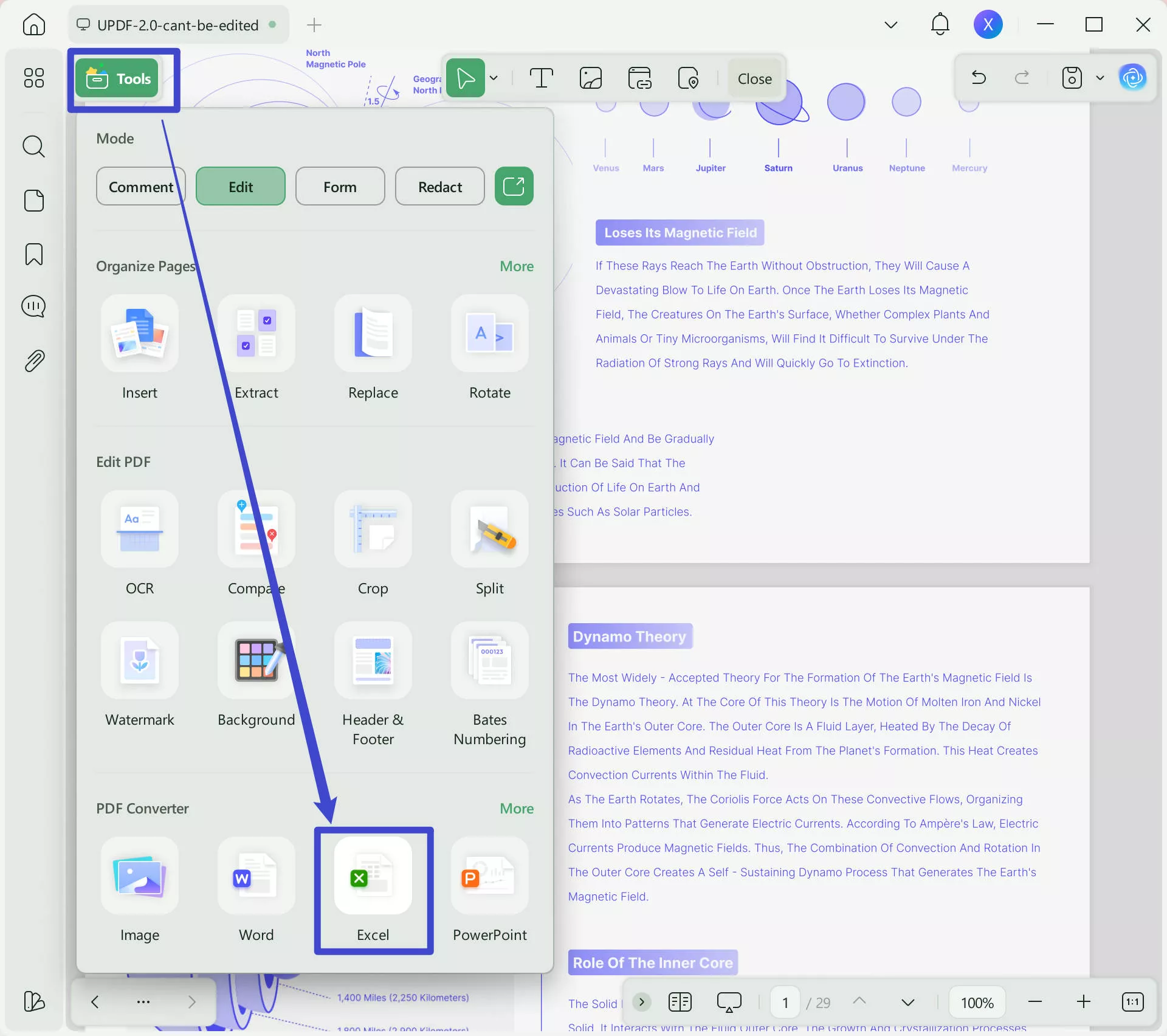
Method 2. Batch Extract Tables from PDF to Excel
Do you wish to extract tables from multiple PDFs to Excel via converting method? UPDF has eliminated the need to waste time dealing with one PDF at a time and has offered the ultimate feature of batch conversion.
With it, you can batch convert multiple Excel files to PDF, extracting the tables from the PDF files without disrupting the format. Here is what you will need to do:
- Same to the above method, if you do not download UPDF on your computer, you can download it via the below button in order to continue. Launch UPDF after installing it and select the "Tools" option.
Windows • macOS • iOS • Android 100% secure
- In the popping window, choose the very first option, i.e., "Convert".
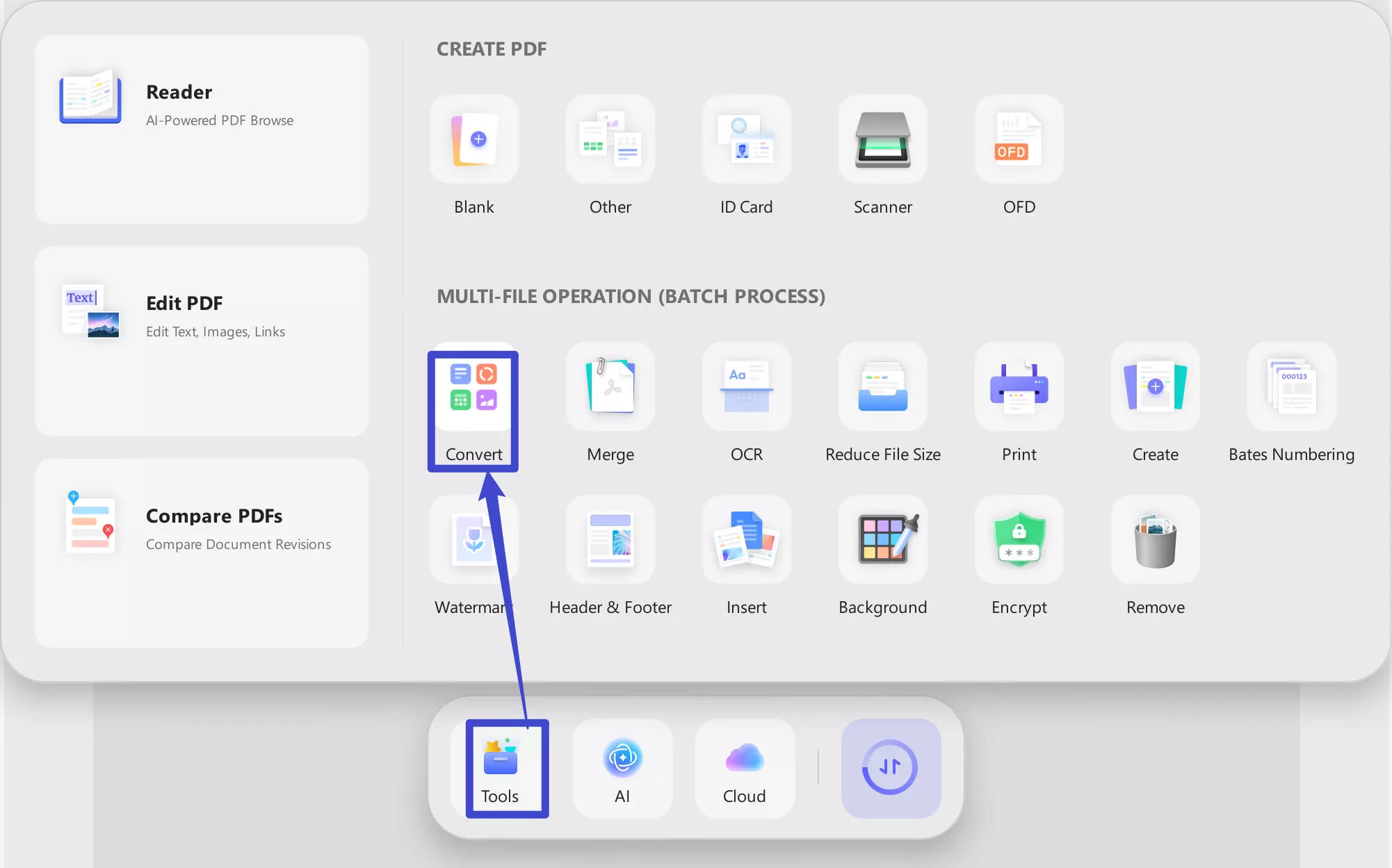
- The next window will ask you to "Add Files". You can opt for multiple methods to do so, including drag and drop, adding completed folders, and more.
- Now, select "Excel" from the list of supported formats.
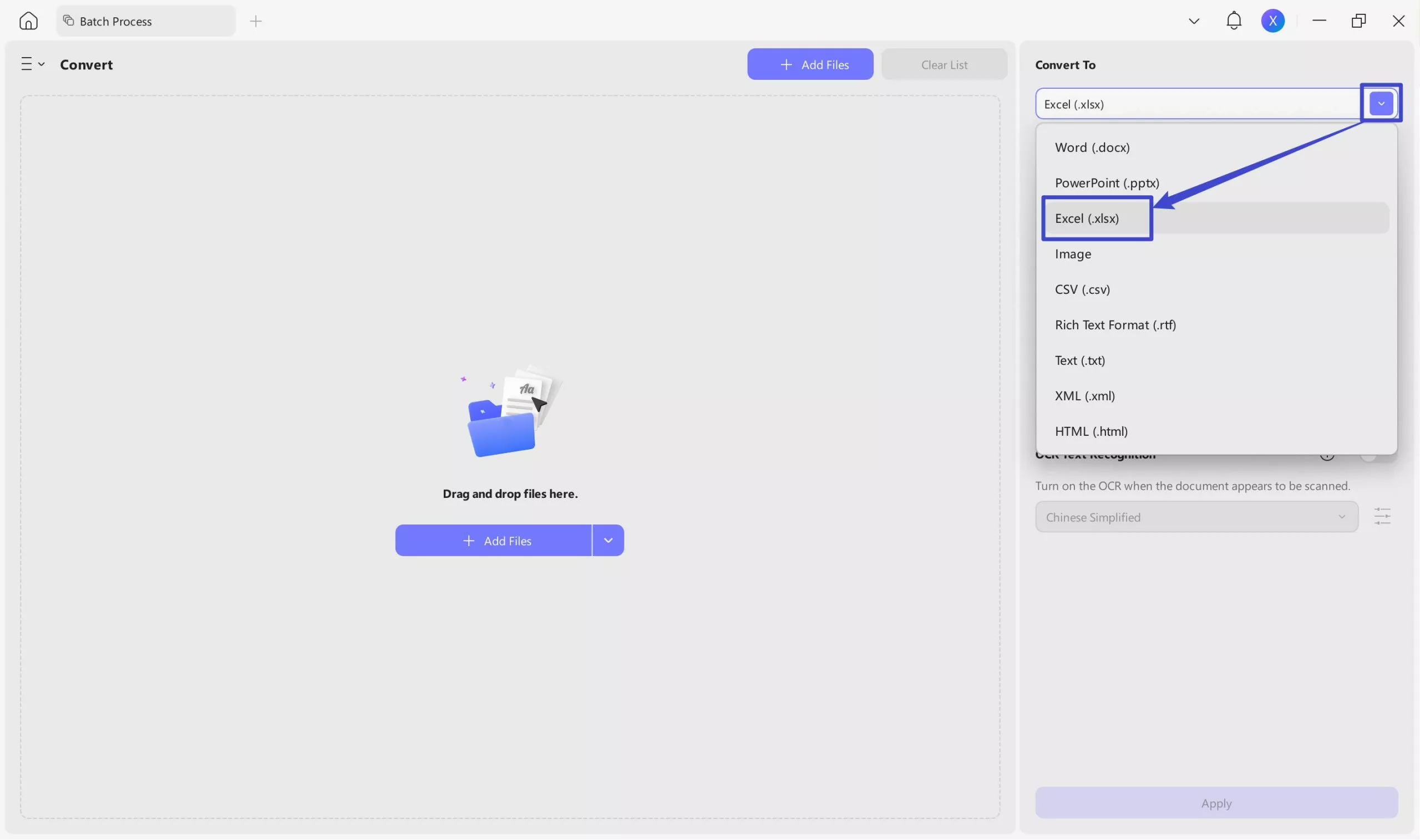
- When all is done, hit the "Apply" button at the bottom right corner of the Batch Convert mode. All your files will be converted to Excel by this last step, extracting tables.
Method 3. Extract Tables from a Scanned PDF
Lastly, we have the most helpful guide, i.e., for extracting tables from a scanned PDF file with the UPDF OCR feature. Follow the steps below to do so:
- Open your UPDF software after downloading it via the below button and begin processing the OCR layout by clicking the "OCR" button in "Tools".
Windows • macOS • iOS • Android 100% secure
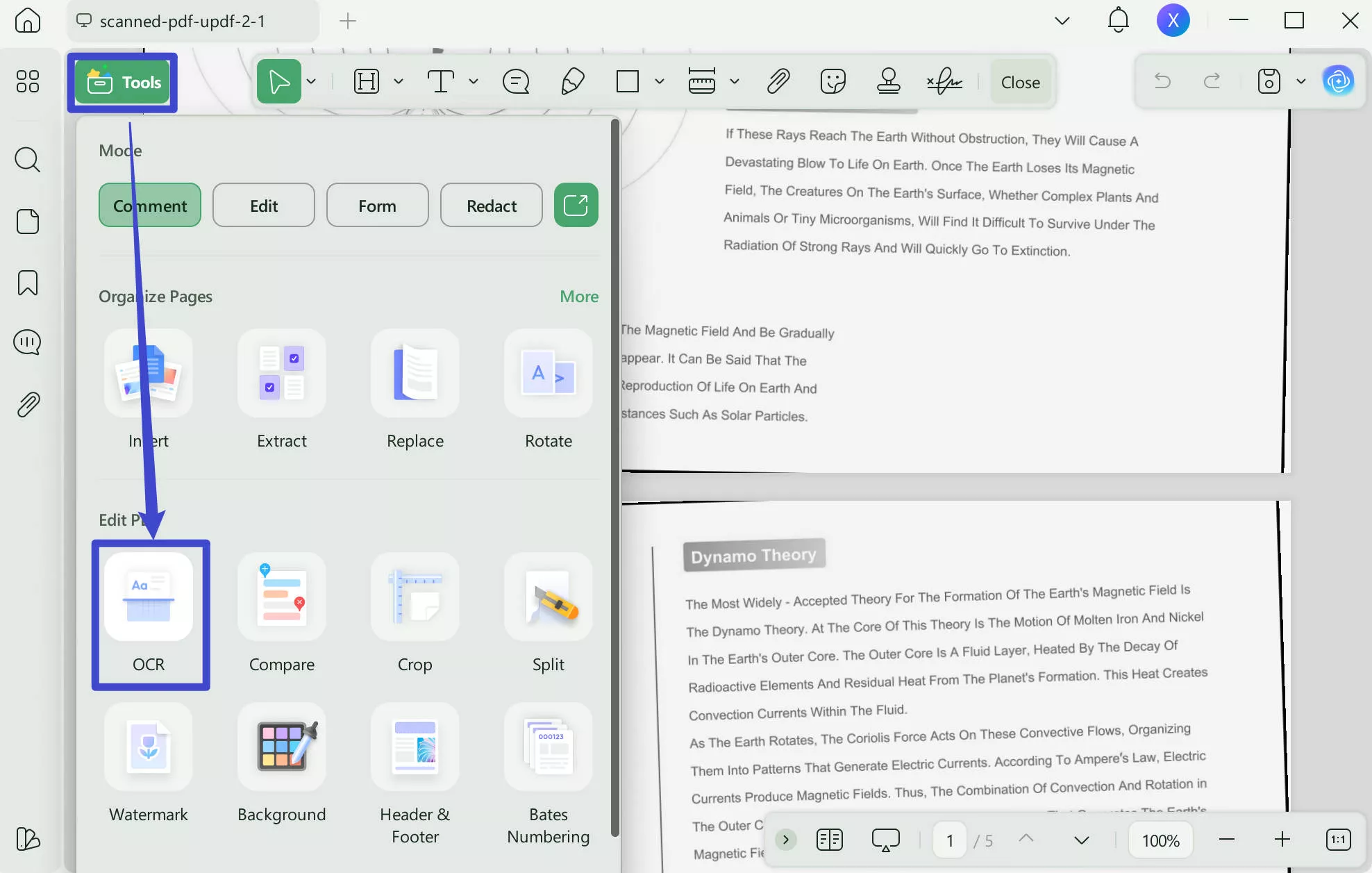
- Next, select the document language from the list of 38 languages supported by the UPDF's OCR technology.
- You can choose "Editable PDF", "Text and Pictures Only", "Searchable PDF Only" from provided options.
- Select the page range on which the table is featured and hit "Perform OCR".
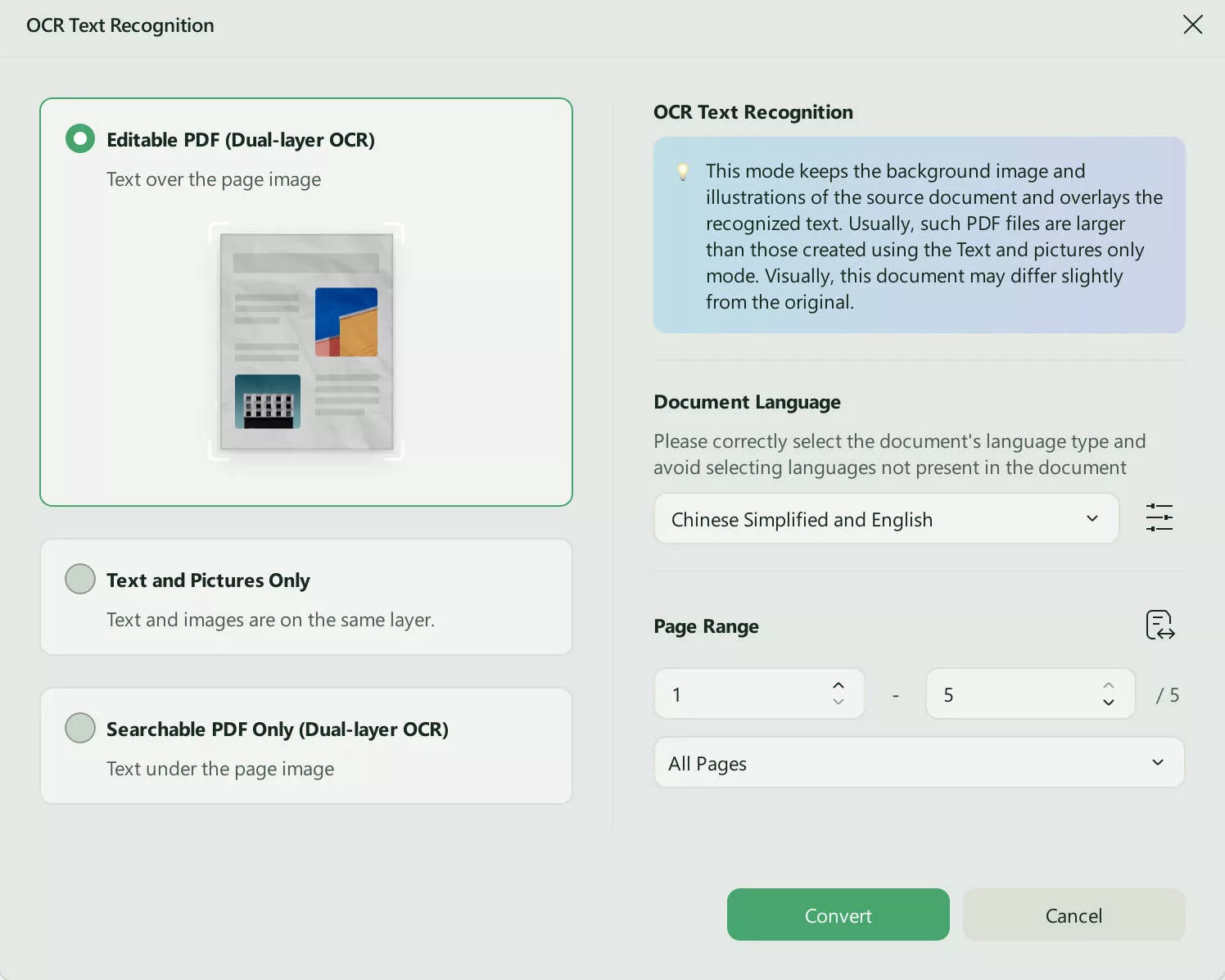
- Now that you have successfully converted un-editable data into editable text formats, simply copy-paste the table to your desired destination or use the above methods.
Method 4. Extract a Table from PDF by Copy and Paste Manually
Another method is to copy-paste the table manually into the Excel file. You will have to follow the following steps to do so:
- Launch UPDF and upload your PDF file by selecting from files or dragging and dropping.
- Go to the Reading Mode; you can select the table you want to extract here.
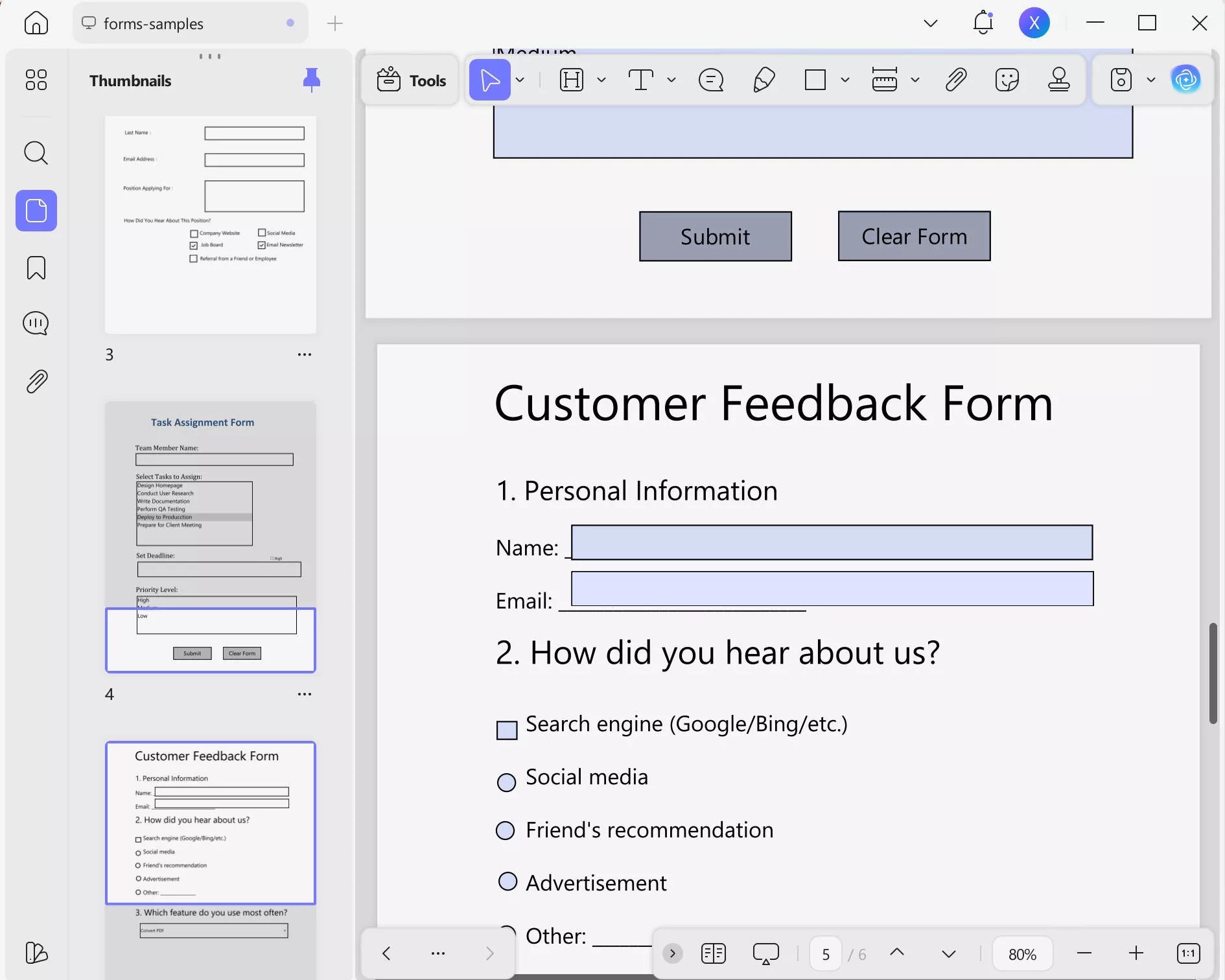
- Copy it using the keyboard shortcut keys, Ctrl+C on Windows or Common+C on Mac.
- Open a new Excel file and paste the table into it using the shortcut keys Ctrl/Common+V.
You can use UPDF to extract tables from PDF with 4 methods that can meet all your requirements. You can download UPDF to test all these methods step by step. And what is worth mentioning is that UPDF is very cheap to own it. It only costs US$39.99 for one year license and US$69.99 for a perpetual license. You can buy it via the UPDF pricing page.
Windows • macOS • iOS • Android 100% secure
Method 5. Extract Tables from PDF using Python
The above-mentioned methods utilized third-party PDF editing software. In this section, we will explain how to extract tables from PDF Python in multiple ways. Without further ado, let's hop on!
Using tabula-py
To use this method, you will first have to install the tabula-py library using the commands:

- Now, refer to this example to continue extracting your PDF table.

- You will have to add your PDF file shown in the image below:
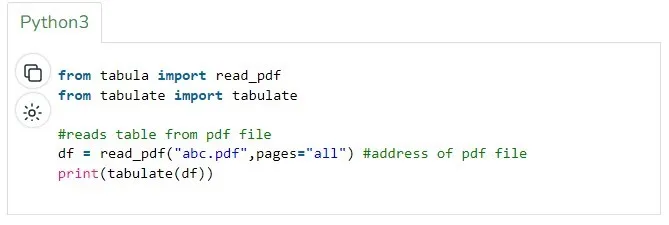
- You will get an output like this:
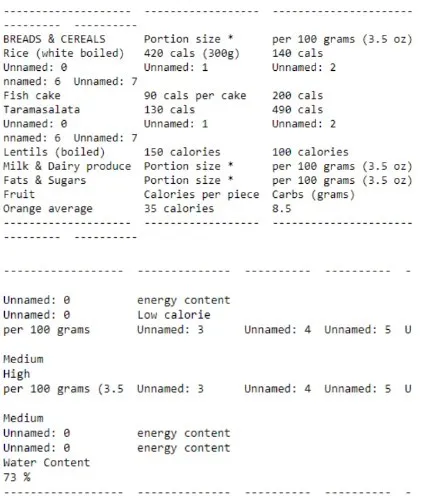
Using Camelot
- Open a new Python file and type in the following command to begin:
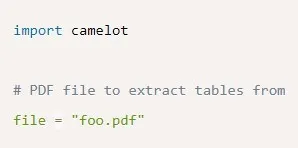
- Let's consider you have a PDF with the following simple tabular data:

- Extract using the command:

- You will get an output, as shown in the image below.
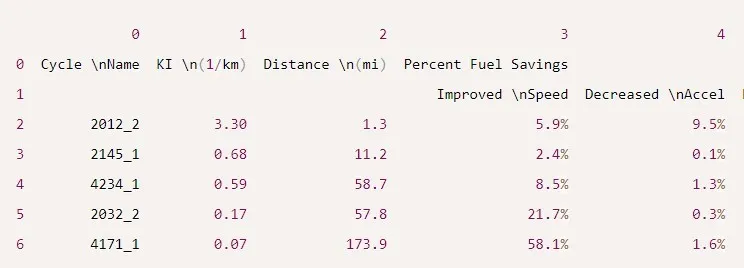
Note: The picture above shows the first four columns; you will generally get your table printed exactly.
FAQs about Extracting Tables from PDF
In this section, we will answer some of the Frequently Asked Questions about exporting tables from PDF to Excel using different methods. So, let's give them a quick read!
1. Why Can't I Extract the Table from PDF?
Are you unable to extract tables from PDF using any of the above-mentioned methods? The main possibility is that your PDF file is restricted, i.e., protected with a password. You will first have to enter the password or remove it to proceed with extracting the table from PDF.
To remove the password, simply open the restricted PDF file in the UPDF. Select the "Protect Using Password" button and hit the "Remove Security" button. In the next popping window, your computer will ask if you are sure to remove security, hit "Remove" again to confirm your decision, and that's it!
2. Can I Extract Tables from PDF Online?
Hear us shouting YES! You can extract tables from PDF online using smart, up-to-date browsers like Google Chrome, Opera Firefox, Safari, and more. Besides this, you can also rely on multiple third-party online platforms that offer focused services for extracting PDF tables to Excel.
However, relying on this method might have some cons, like you must have a strong internet connection to extract and export tables from PDF to Excel. Moreover, most online tools keep track of the files uploaded to them, risking your privacy. There are no such limitations or issues when using UPDF.
3. What Tool is Used to Extract Tables from PDF?
Here are multiple PDF tools that can help you extract Excel from PDF. According to our experts, the best one you can rely on is the UPDF! It offers multiple methods of extraction. These include the following:
1.Extract Tables from a PDF to Excel
2.Batch Extract Tables from PDF to Excel
3.Extract Tables from a Scanned PDF
4.Extract Table from PDF by Copy and Paste
You can rely on the guides above for detailed instructions about these methods.
Wrapping It Up!
That was a comprehensive guide on extracting tables from PDF to Excel using a handful of different methods, i.e., converting the file with UPDF, batch converting files with PDF, simple copy-pasting, and using different Python commands for the purpose.
Though all methods have significance, the best one you should opt for, owing to its accuracy and efficiency, is using UPDF. UPDF offers an array of features, which get updated to offer a better user experience. It's the ultimate solution for all your PDF-related concerns, so be sure to download it via the below button to check it out! Hope you find this info worth reading. Stay tuned for more informative guides. Moreover, upon visiting this site, you can discover an unbiased review of UPDF that is sure to capture your heart.
Windows • macOS • iOS • Android 100% secure
 UPDF
UPDF
 UPDF for Windows
UPDF for Windows UPDF for Mac
UPDF for Mac UPDF for iPhone/iPad
UPDF for iPhone/iPad UPDF for Android
UPDF for Android UPDF AI Online
UPDF AI Online UPDF Sign
UPDF Sign Edit PDF
Edit PDF Annotate PDF
Annotate PDF Create PDF
Create PDF PDF Form
PDF Form Edit links
Edit links Convert PDF
Convert PDF OCR
OCR PDF to Word
PDF to Word PDF to Image
PDF to Image PDF to Excel
PDF to Excel Organize PDF
Organize PDF Merge PDF
Merge PDF Split PDF
Split PDF Crop PDF
Crop PDF Rotate PDF
Rotate PDF Protect PDF
Protect PDF Sign PDF
Sign PDF Redact PDF
Redact PDF Sanitize PDF
Sanitize PDF Remove Security
Remove Security Read PDF
Read PDF UPDF Cloud
UPDF Cloud Compress PDF
Compress PDF Print PDF
Print PDF Batch Process
Batch Process About UPDF AI
About UPDF AI UPDF AI Solutions
UPDF AI Solutions AI User Guide
AI User Guide FAQ about UPDF AI
FAQ about UPDF AI Summarize PDF
Summarize PDF Translate PDF
Translate PDF Chat with PDF
Chat with PDF Chat with AI
Chat with AI Chat with image
Chat with image PDF to Mind Map
PDF to Mind Map Explain PDF
Explain PDF Scholar Research
Scholar Research Paper Search
Paper Search AI Proofreader
AI Proofreader AI Writer
AI Writer AI Homework Helper
AI Homework Helper AI Quiz Generator
AI Quiz Generator AI Math Solver
AI Math Solver PDF to Word
PDF to Word PDF to Excel
PDF to Excel PDF to PowerPoint
PDF to PowerPoint User Guide
User Guide UPDF Tricks
UPDF Tricks FAQs
FAQs UPDF Reviews
UPDF Reviews Download Center
Download Center Blog
Blog Newsroom
Newsroom Tech Spec
Tech Spec Updates
Updates UPDF vs. Adobe Acrobat
UPDF vs. Adobe Acrobat UPDF vs. Foxit
UPDF vs. Foxit UPDF vs. PDF Expert
UPDF vs. PDF Expert








 Italo Rossi
Italo Rossi 

 Enola Miller
Enola Miller 
 Delia Meyer
Delia Meyer 
 Enrica Taylor
Enrica Taylor